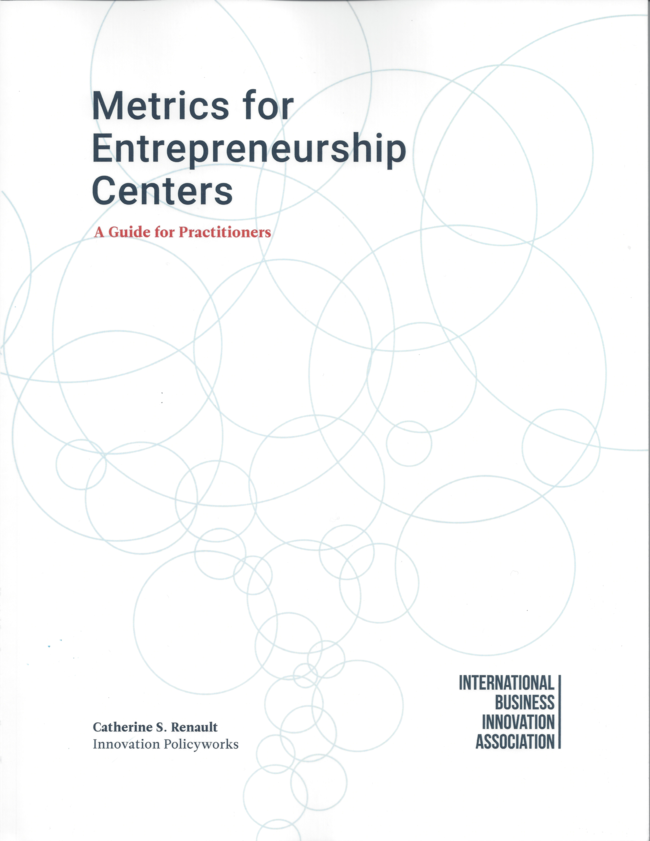|
|
|
Notes from Innovation Policyworks

You can tell from the nearly constant attack ads on television during the evening news that we're in the middle of at least two contentious campaigns this fall here in Maine: one for Governor and one for the 2nd Congressional District, where a Republican Congressman is trying to keep his seat. Both races are very close. However, in all the noise, one thing is startlingly missing: a clean and compelling vision for how to improve Maine's economic prospects. This is because the choices continue to be framed as less taxes and regulation for business against more rights and benefits for workers.
I recently reread Rob Atkinson and Stephen Ezell's 2012 book,
Innovation Economics, which reminded me that the answer is something completely different from this false paradigm. Atkinson and Ezell say there are three things that build vibrant, healthy business establishments in globally traded sectors in order to improve economies: business leaders who will take risks, do research and development or create new products, and add new plant and equipment; workforce that supports these changes instead of being afraid of new technology; and government that supports investing in the future.
There are bright lights in many of the communities where I work, where entrepreneurs are taking risks, where business leaders recognize the need to invest in creativity and where civic leaders are adopting innovation and entrepreneurship as guiding principles for their cities, towns and states. Here's hoping that grassroots change will save the day.
Read the whole post HERE.
Cathy
|
Smaller Places Seem to be Showing A Little More Economic Growth
In 2017, rural places captured a slightly disproportionate share of US job growth, while the big cities slightly underperformed.
The reason: resource extraction, mining and logging sectors have seen rapid employment growth and machinery manufacturing has been growing as well. While most of the job creation has taken place in metro areas with more than one million in population, the growth
rates are higher in small and rural communities. Read the report
HERE.
At the same time, workers with low levels of education still haven't recovered from the Great Recession. Those with less than high school education, high school graduates and those with some college experienced the greatest harm during the recession, and those gaps persisted into 2013. While the gaps have been reduced, these cohorts still are employed less than those with more education. These individuals are disproportionately living in rural America, yet another drag on their economic prospects. Read the analysis
HERE.
But there's something else going on. People are moving back to their hometowns to start small businesses. These entrepreneurs are taking advantage of lower costs of living, the opportunity to participate in a community in a meaningful way, and the ability to connect because of technology regardless of where one lives.
|
TN Investment Program: Great Success or Boondoggle?
TNInvestco so far has underperformed expectations, with small job gains for the state and huge tax credits for insurance companies.
Back in 2008, Tennessee approved TNInvestco, an investment program funded by $200 million in tax credits to insurance companies (a so-called Capco approach). Investment groups selected by the state in 2009 and 2010 have allocated around $130 million to 187 companies, and 1850 jobs have been created, a cost of about $108,000 per job. Critics of the program say that TN could have used the funds for other approaches that would have been more cost effective, while proponents say the benefits are still too new to be fully realized. See the TNInvestco report
HERE and commentary
HERE and
HERE.
|

Entrepreneurship in France
A huge incubator in France is home to many startups and innovation arms of major companies.
The narrative is that entrepreneurship is an American thing, and we shouldn't worry about the rest of the world because we're more entrepreneurial. The emptiness
of this canard is evident at Station F, the world's largest tech incubator, a 111,550 sq. ft. converted freight train station in Paris. Station F opened in June 2017 with 1,000 founders, the same month that President Emmanuel Macron unveiled a mission to make France "a startup nation." Interestingly, Station F is home to many large companies like Apple, Facebook, Google, but also L'Oréal, and LVMH, an umbrella group of many high end cosmetic and fashion companies. As Fortune notes, this suggests the opportunity for something beyond Silicon Valley's la vie en bros, with finesse and specificity out innovating disruption and scale. Read Fortune's coverage
HERE
and visit the Station F
website
.
|
California's Commitment to Carbon Neutrality
Governor Jerry Brown's Executive Order is bold step for world's fifth largest economy.
California has joined Hawaii by committing itself to total, economy-wide carbon neutrality by 2045. This commitment means that the state will focus on transportation, heating and cooling, industry and other services that rely on direct fossil fuel combustion, as well as electricity generation. This challenge is expected to spark innovative tech solutions across multiple sectors. Read more
HERE.
|
American Innovation Act of 2018
New provisions would support startups.
H.R. 6756, the American Innovation Act of 2018, is being considered in the Congress. Among its provisions is a section that would allow startups to carry forward their losses and R&D Tax credits accrued in the company's first three years of existence. Currently Section 382 of the tax code, written in the mid-1980s to prevent companies from buying and selling net operating losses (NOL) to offset other unrelated income, prohibits startups from carrying forward NOLs. The National Venture Capital Association is supporting the measure. Read more
HERE.
|
Free College Doesn't Seem to Work as Promised
Performance requirements undercut objectives.
In response to concerns about the rising cost of a college education, new programs that promise "free college" such as eliminating tuition and fees have emerged. The first serious study of a program like this, the Degree Program in Milwaukee Public Schools, has just come out, and the results are disturbing. The researchers found that while the Degree Project has some impact on student's motivation, college expectations and steps toward college, such as applying to schools, it has no effect whatsoever on whether the students actually went to college. A close read of the study suggests that the culprit is the performance requirements in these programs. While performance requirements seem to make sense, by limiting the "free college" to those most likely to succeed, the real effect was to limit the number of students who could participate. Another issue was that while the Program elicited some changes in high school, the schools themselves still didn't offer a college preparatory curriculum, for instance, or encourage students to consider college. Read the whole analysis HERE.
|
Finally, Telecommuting Data
More people telecommute than use public transit.
The US Census Bureau is counting the number of people who telecommute (or work remotely) - they ask folks how they get to work! Last year, 5.2 percent of American worker reported they usually telecommute, a number that's rising. This is more than the number of people who get to work by public transportation (5 percent!). A 2016 Gallup survey found that 43 percent of employees spent at least some time working remotely, whereas the Census asked how they "usually" get to work. Most working from home were professional, scientific, management and administrative workers. And, it's employees of private companies, not the self-employed, who are driving up these numbers. Read more
HERE.
|
|
| |
|
"
Change is the law of life. And those who look only to the past or present are certain to miss the future.
"
|
|
Innovation Spark of the Month

New York City's Mount Sinai Hospital teamed up with design studio Cactus to create Lab100, a hybrid clinic and research lab that empowers patients to track their own health. Lab100's view of health is more holistic than traditional physical exams.
Trend-Watching asks:
Which industry traditions are holding you back and might customers appreciate you breaking them?
|
New Incentives: Opportunity Zones
Opportunity Zones could be a new method for getting investment in rural areas.
The tax package passed by the Congress at the end of 2017 contained a provision for Opportunity Zones, a new tool for states and regions. Opportunity Zones, designated by Governors, are low-income census tracts that offer tax incentives to investors who invest and hold their capital gains in Opportunity Funds. There is a temporary deferral if the investment is held for at least 5 years and any earnings are exempt if held for 10 years. States have designated 8700 Opportunity Zones so far. The costs and benefits of the program are as yet unknown. Read an assessment
HERE.
|
Disrupting Disruptive Innovation
Incumbent firms need to innovate more to avoid rapid change in their fields.
Clayton Christensen's theory of disruptive innovation explained the kind of technological breakthroughs that enable startups to challenge industry incumbents. Howard Yu, a professor at IMD Switzerland, now says, what happens with the pace of an industry's change takes off? Yu notes the huge disadvantage that incumbent face when faced with new entrants who can invest for growth and not worry about existing assets. He argues that in order to maintain their competitive advantage, incumbents need to open up their innovation funnel. Read a great interview
HERE.
|
|
Quick Links
Maine's Knowledge Economy: A Snapshot 2017
|
Metrics for Entrepreneurship Programs
 Have you been wondering how to convince your stakeholders that your program is performing well? My book on evaluating entrepreneurial programs, written for the International Business Innovation Association (iNBIA), is available on its website. The basics apply to any economic development program. Check it out HERE. Have you been wondering how to convince your stakeholders that your program is performing well? My book on evaluating entrepreneurial programs, written for the International Business Innovation Association (iNBIA), is available on its website. The basics apply to any economic development program. Check it out HERE.
|
|
|